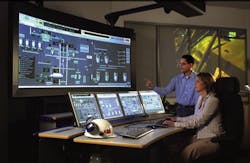ABB Supports OPC UA in System 800xA
Released in the summer of 2006, the OPC Unified Architecture (UA) standard helps third-party components, devices and systems quickly and easily integrate with the System 800xA Extended Automation system from global automation supplier ABB. OPC UA works with System 800xA’s unique object management infrastructure when integrating these third-party systems, to provide customers with even greater reliability, security and ease of integration than prior generation OPC interfaces. “The OPC UA standard works with System 800xA’s object management infrastructure to facilitate simpler and more secure integration with third-party systems and devices for our automation customers. This will help them achieve even greater visibility into and control of their manufacturing enterprise by making it easier to broaden and deepen their system reach,” says Jeff Harding, Chief Software Architect, Process Automation, ABB Inc. “In addition to this improved visibility and information access, OPC UA helps increase the reliability and security of third-party systems through the standardization of state-of-the-art technology.” OPC UA is an expansion of the highly successful basic OPC communication protocol; it enables data acquisition and information modeling/communication between the plant floor systems and enterprise systems. The Unified Architecture is designed specifically to allow object and information models defined by others (vendors, end-users, other standards) to be exposed without alteration by OPC UA Servers. OPC UA works with System 800xA’s unique object-based architecture to provide deep integration with disparate plant systems and other third-party devices and components via a standard interface, eliminating the need for additional configuration. It essentially automates third-party integration with System 800xA. The standard interface also integrates third-party servers more securely, and with better reliability than prior generation OPC interfaces. ABB’s patented Aspect Object framework is the enabling technology for System 800xA’s data access, storage and management. Aspect Objects relate all plant data, the Aspects, to specific plant assets, the Objects. This eliminates the cumbersome task of locating information spread among different personnel, locations, computers and applications. Aspect Object navigation presents the entire production facility in a consistent, easy-to-view fashion, accessible from a single user interface that is configured to present information and provide interaction in a context appropriate to all user disciplines.System 800xA significantly extends process control and enterprise visibility well beyond the realm of essential process control to include production management, safety, smart instrumentation, smart drives and motor control, information management, asset optimization, simulation and documentation. System 800xA integrates these areas so that information can be viewed, accessed and appropriately modified from its single operations environment, allowing plants and mills to run more efficiently and achieve substantial cost savings. Its unique engineering environment manages one set of consistent data, for single-point entry, single-point change and re-use across the plant to help users extend and repeat their most successful engineering strategies and best practices.To find out more, visit ABB at www.abb.com/controlsystems.

